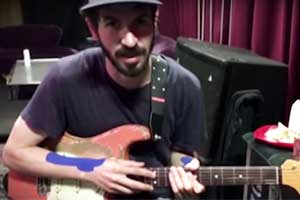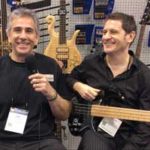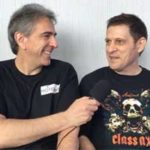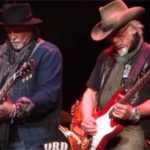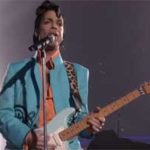Linkin Park guitarist talks about the making of the band’s polarizing new album
By Gary Graff
June 23, 2017
Before adopting its current band name, Linkin Park was known as Hybrid Theory — and it used that for the title of its Diamond-certified 2000 debut album. And the Los Angeles sextet has indeed been practicing musical hybridism ever since, moving from its early aggro rap-metal to incorporate electronic and other influences, with every one of its albums debuting in the Top 5 of the Billboard 200. Linkin Park’s latest One More Light, is the group’s fifth No. 1 and also its most polarizing yet, incorporating more mainstream pop flavors as the result of collaborations with hit-making songwriters and producers such as blackbear, Dan Wilson, Justin Tranter, Andrew Goldstein and others. Some fan reaction has been so vociferous that frontman Chester Bennington even lashed out on social media, apologizing later. But the strong initial sales and sell-out concerts would indicate that despite any reservations, Linkin Park fans will bend but not break and don’t seem likely to abandon ship any time soon. And that’s a relief for guitarist Brad Delson, who co-produced One More Light with bandmate Mike Shinoda…
FGPO: How did Linkin Park happen upon this direction for One More Light?
Delson: I think the creative source of these songs was the inspiration to approach this album as songs. I know that sound ridiculous, because we’re always making songs. But our process has previously been to build [songs] out of a whole bed of music and then put our vocals on top of it at the end. The music becomes maybe more experimental, or just driven by the instrumental musicality of things. But when we started working with Rick Rubin back on Minutes To Midnight, he challenged us to try something different, to actually try coming up with melodies and words as early as possible. We told him that sounded like a great idea, and we unintentionally have ignored him for three albums and kind of relied on what’s habitual. So for whatever reason, we woke up before this creative period and said: “Hey, remember that idea of just starting with a melody or a vocal idea? What if we really did that?!” So for whatever reason, we were ready at this point in our musical career to dive in head-first at the deep end of songs and start with concepts, start with feelings, start with words and melodies.
FGPO: Was it an easy transition?
Delson: It was a leap for us to start with melody right away; I mean, we could do it but I wouldn’t say it’s our go-to move. But we did that pretty much to the tune of 70 songs, seven-zero, we wrote that way and we ultimately narrowed them down to our favorites. And then we were facing the unique challenge that we’ve never really had before of: “Oh, wow, we’ve actually got the context but we don’t have the style to give these songs the context they need. So then it was in the musicality that came later that we discovered it with our instrumentation.
FGPO: Was there a “Eureka!” moment where you knew you had what you wanted?
Delson: I think the eureka moment for us was hearing some of the early songs and getting really excited about them, and part of it, to be frank, was the inspiration that came out of the process itself. We wound up going into sessions with people who just write songs every day. We’ve never had co-composers work on stuff with us, robustly; we’ve done it in a limited capacity, but we never really jumped into these “Let’s write a song!” type sessions. And it was kind of scary, like we didn’t know if we’d be good at it or like it. And Mike had an early couple of sessions in London and came down with these very stripped-down but very robust songs, literally just on his iPhone voice memos — no production, no Pro Tools. It was: “Hey, we wrote the words, we wrote the chords and I came out of it with a song,” and that was so rewarding.
FGPO: What’s the biggest difference between the processes you describe?
Delson: When you start with the music, oftentimes you can be a month into a “song” until you even have a melody. And in this case we had a finished idea. I got an early taste of that with some of our collaborators and just loved it, and we just kind of doubled down on “Let’s be as open as possible. Let’s learn as much as we can. Let’s reach out to people who we’re fans of and meet them and build friendships and make music.” So we took it one step further and worked with people and really stretched out of our comfort zone. To be able to approach it through the eyes of, like, total naiveté, of really not knowing what we’re doing and then learning and discovering, I think it just brought out a real passion in the work.
FGPO: How did you approach your playing on this album? It doesn’t seem like a guitar kind of album, but there’s a lot of guitar on it, isn’t there?
Delson: Yes, thank you. I love the guitar work on this album. It’s definitely not as in-your-face as some of my solos are on the last album, The Hunting Party. However, there was no less love and importance in the guitar work; it just winds up being a more layered approach, sometimes a more vulnerable cover and we worked really hard. I love working with our engineer, Ethan Mates; he’s got this incredible collection of handmade pedals I’ve never seen. He collects these things, so every time we want to add a tone we start from this place of wonder and discovery, of putting together all these kind of sonic tools until the part we want kind of emerges.
FGPO: Was it tough to kind of sublimate the headbanger or shredder side of you?
Delson: [laughs] In terms of how the guitar interplays with the other elements, one of our goals in terms of arrangements for this record was to destroy the notion of genre. What that really means is introducing elements that seem to be maybe in conflict with one another but all influences and elements that we love and putting them together in a kind of soup where you can’t pull apart one style or one influence but it all fits naturally together.
FGPO: Got a for-instance or two?
Delson: I can give you a lot of examples. One that jumps out at me is the song “Sorry For Now;” we worked on that with blackbear and Andrew Goldstein and we wanted to do an electronic-style drop. So after the chorus you get this instrumental hook, and even though the song structure derives from electronic dance music, the sounds you hear are really driven by the guitar work, cut up and chopped with vocal samples. That was really exciting for us because it’s something that one might be familiar with, but it’s a take on it that sounds uniquely our own. That was kind of our goal in every instance was to blend these elements together.
FGPO: Given how different the album sounds, were you apprehensive about how it would be received?
Delson: It’s scary to be so honest and revealing, in a way, but I think ultimately that’s what people connect with. I think that the talk about style is a little bit of a red herring. I think from the beginning of our career what serves us is writing; it’s trying to write the best songs we can in whatever form or manner we’ve been able to build them and share them, and this album was no different. The approach was really fun ’cause it was out of our comfort zone, but the goal was to write the most honest, connected songs possible. That’s something we’ve done throughout our whole career. However you stylize them, it’s ultimately serving what’s being said, and in terms of just the honesty and the intimacy of this album I think there was no holding back. We just chased the greatest music we can make, and you never know how people are going to respond to it. The hope is if the six of us in the room feel really moved and connected with what we’re making and want to listen to it, then other people out there will connect with it as well.
FGPO: Chester, of course, went off very publicly at some fans who weren’t feeling the initial singles. How did the band react to that internally?
Delson: I don’t think anyone said anything to him. I think that he’s a very passionate person and he cares deeply about the music that we’re making, and personally I’m so proud of him and grateful to him for the beauty and the vulnerability and the passion that he put in these performances. I know he, like all of us, is really excited for everyone to be able to hear the album. The fact that it debuted even beyond what we predicted is a great starting point, and now we get to bring those songs on the road and share them every night.
FGPO: Given that polarization, having it debut at No. 1 must have been gratifying indeed.
Delson: Yeah, and obviously there are always risks involved, and so for us the reward is the music itself. To have a fifth album hit No. 1 is really humbling and we’re just super grateful for everyone who collaborated with us on this project, to our team and to our fans here in the states and around the world, ’cause the album had a huge debut globally.
FGPO: How is the new material working on stage?
Delson: I would say surprisingly, or not so surprisingly, these songs are very natural for us to play because of the way they were written. They’re almost easier to share and play whereas on other albums that translation process from what we did in the studio to the stage took some thinking and some work. These songs are very versatile. They’re natural to play. They fit in with the other songs really well. And one thing we’re pushing ourselves to do in the spirit that the songs were written is to be able to play the songs in different forms, whether it’s the version you hear on the album or it’s something really stripped down and intimate. I think these songs lend themselves to that kind of dimensionality.
FGPO: You mentioned 70 songs and there are only 10 on the album. What’s going to happen with the rest?
Delson: There’s definitely a few gems that we’ve got in our back pocket, but I would say a vast majority of those songs fortunately will never see the light of day, ’cause they were just a part of the journey. The ones that were the most satisfying and exciting were the ones we ultimately focused on and finished and made up the album.
